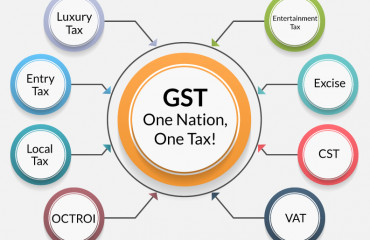
NEW DELHI : The central government is likely to tell states at the next meeting of the Goods and Services Tax (GST) Council that the buoyant GST revenue trend shows that states no longer need funds from the Centre as compensation for the 2017 indirect tax reform.
NEW DELHI : The central government is likely to tell states at the next meeting of the Goods and Services Tax (GST) Council that the buoyant GST revenue trend shows that states no longer need funds from the Centre as compensation for the 2017 indirect tax reform.
The next GST Council meeting is expected to be held sometime this month.
The Centre is expected to tell states that 20% growth in GST revenue collections in April was more than states' protected revenue growth rate of 14% backed by GST compensation from the Centre.
Also, large state economies such as Maharashtra, Uttar Pradesh, Rajasthan, Haryana, and Gujarat have recently had strong revenue collections.
Some of the states need to clear their state budget-related formalities and, once that is done, the next GST Council meeting will be convened, said a person familiar with the discussions between central and state governments.
State governments continue to demand GST compensation beyond June 2022. However, they are aware that proceeds of GST cess collection will have to be used to service the debt raised in the last two financial years to meet the compensation shortfall and do not see the possibility of the Centre extending compensation payments beyond June, said a state government official, who also spoke on condition of anonymity.
Private final consumption expenditure at current prices recovered to pre-pandemic levels in FY22, growing at more than 16% annually, explaining the boost in the tax on consumption received in the year, according to official data.
Policy makers are also working on proposals to tax casinos and race courses, as well as online gaming.
A group of ministers led by Meghalaya chief minister Conrad Sangma is examining the feasibility of imposing a 28% GST rate on these segments.
These firms are paying 18% GST backed by court orders in the absence of clarity on the subject. Businesses claim these are games of skill rather than that of chance.
Policy makers are also working on a clarification that is needed on the applicability of the federal indirect tax on certain types of cryptocurrency transactions that are neither in the nature of goods nor services.
However, there is no proposal at present to raise GST rate on services of cryptocurrency exchanges from 18% now to 28%, said two government officials, who also spoke on condition of not being named.
Industry players have been worrying about an increase in the GST rate on cryptocurrency services after the Centre introduced a 30% income tax on income from transfer of virtual digital assets, including cryptocurrencies, with no set-off for losses and no deduction for costs other than the cost of acquisition.
Cryptocurrency trading is also subject to the deduction of 1% tax at source.
Items that fall in 28% GST category are those that are perceived to be non-essential in nature, which also give authorities the opportunity to raise more revenue, according to Muralidharan R, partner, Deloitte India.
Another ministerial group is examining proposals for GST rate rationalisation, but it remains to be seen whether the GST Council will take these up in the near future given the surging inflation.
Emails sent to the finance ministry and the GST Council secretariat on Monday seeking comments for the story remained unanswered at the time of publishing.
